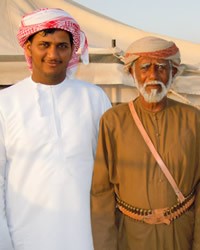Harasi, Arabized in Oman

Photo Source:
NomadsinOman.com - Dawn Chatty
|
Send Joshua Project a map of this people group.
|
| People Name: | Harasi, Arabized |
| Country: | Oman |
| 10/40 Window: | Yes |
| Population: | 2,800 |
| World Population: | 2,800 |
| Primary Language: | Arabic, Omani |
| Primary Religion: | Islam |
| Christian Adherents: | 0.00 % |
| Evangelicals: | 0.00 % |
| Scripture: | Translation Started |
| Ministry Resources: | No |
| Jesus Film: | No |
| Audio Recordings: | Yes |
| People Cluster: | Arab, Arabian |
| Affinity Bloc: | Arab World |
| Progress Level: |
|
Introduction / History
The Harasis tribe is an isolated, nomadic Bedouin tribe found in the central desert of Oman. It is believed that they migrated into the region of Oman during the 2nd and 3rd centuries AD. They claim Qahtani ancestral heritage, one of two major historic tribal ancestries of Bedouin tribes in Oman. The Harasis also identify with the Hinawi tribal political affiliation. There are around 5,000 people of the Harasis tribe today in Oman. They are recognized as being strong and independent, considered by some as representing the character and spirit of traditional Omani identity.
Where Are they Located?
The Harasis tribe is located in the Jiddat il-Harasiis desert of Oman, a large gravel and desert plain that separates northern Oman from the southern Dhofar region. This desert is extremely dry and hot, particularly during the summer months. Some Harasis have settled in urban areas and can be found in the central desert towns, particularly in the city of Haima and surrounding region.
What Are Their Lives Like?
The Harasis are a primarily nomadic and pastoral people. Animal husbandry is the key to life for this small desert community, although there is some limited crop cultivation. Camels and goats are kept and bred primarily for producing milk. Women own and take care of goat herds, while men own and take care of the camel herds. The well being of the family is believed to be directly linked to the well being of the herd. Men wear traditional white robes, turbans and a decorative belt and knife called a Khanjar. Women wear black robes and traditional Bedu face masks. Family life is typical of most Bedouin Muslim traditions, including larger families and arranged marriages. Nomadic life demands constant movement, living in tents and tending to the herds. In recent decades, modern technology has made a significant presence in Harasis life, especially vehicle transportation and well-pumps. Instead of packing tents onto camels, most families use trucks and SUVs to move across the desert as their herds search for grass and shrubs to eat. The Harasis people are the most isolated tribe in all of Oman. They pride themselves for their robustness, fierce independence, and ability to survive with little to no water. Their identify is often tied to their total social and political isolation from the rest of Oman and Arabian Gulf. However, some men now hold skilled jobs in urban areas, including positions in the Army and the Police Force. These men will work in the cities until the holiday season, and return to the central desert for extended vacations. Women are much less likely to venture away from the family and community. Education is limited, although there is a boarding school established for boys and a day school for girls in the central desert town of Haima.
What Are Their Beliefs?
The Harasis tribe follows the tradition of most Bedouin tribes and adheres to the religion of Islam. However, little is known about their daily religious practices or beliefs. It is common for Bedouin tribes to follow Sunni Islam, although Sufism and animistic beliefs are also prominent among the Bedouin.
Prayer Points
Pray for God to send laborers to the Arabized Harasi in Oman.
Pray for breakthrough and for the first salvations among the Arabized Harasi of Oman.
Pray that God will provide divine appointments with persons of peace, wisdom and divine strategies for any workers or agencies pursuing this frontier people group.
Pray that God will mobilize translation teams to pursue the creation of Scripture and audio resources.
Ask God to mobilize prayer and intercession for this people in order for a great move of God to occur.
Pray that leaders are developed and strong churches are established among the Arabized Harasi.